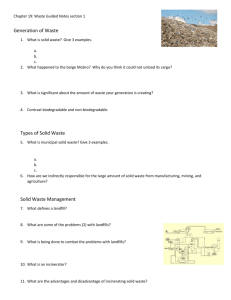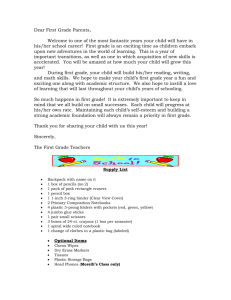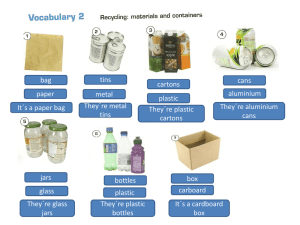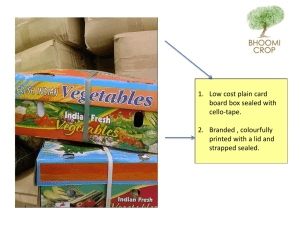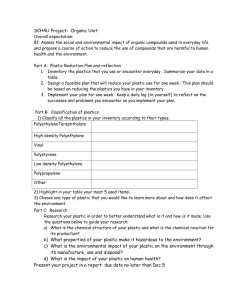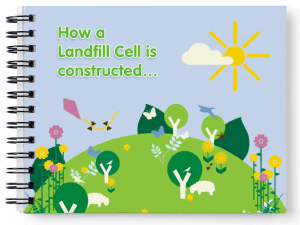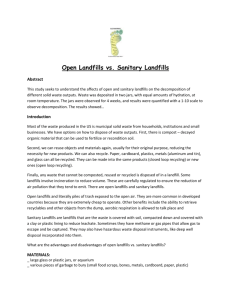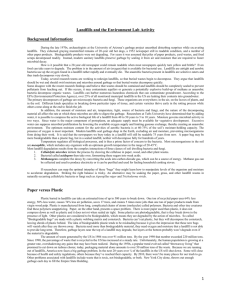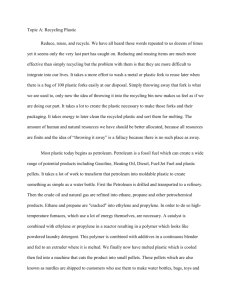waste environmental
advertisement
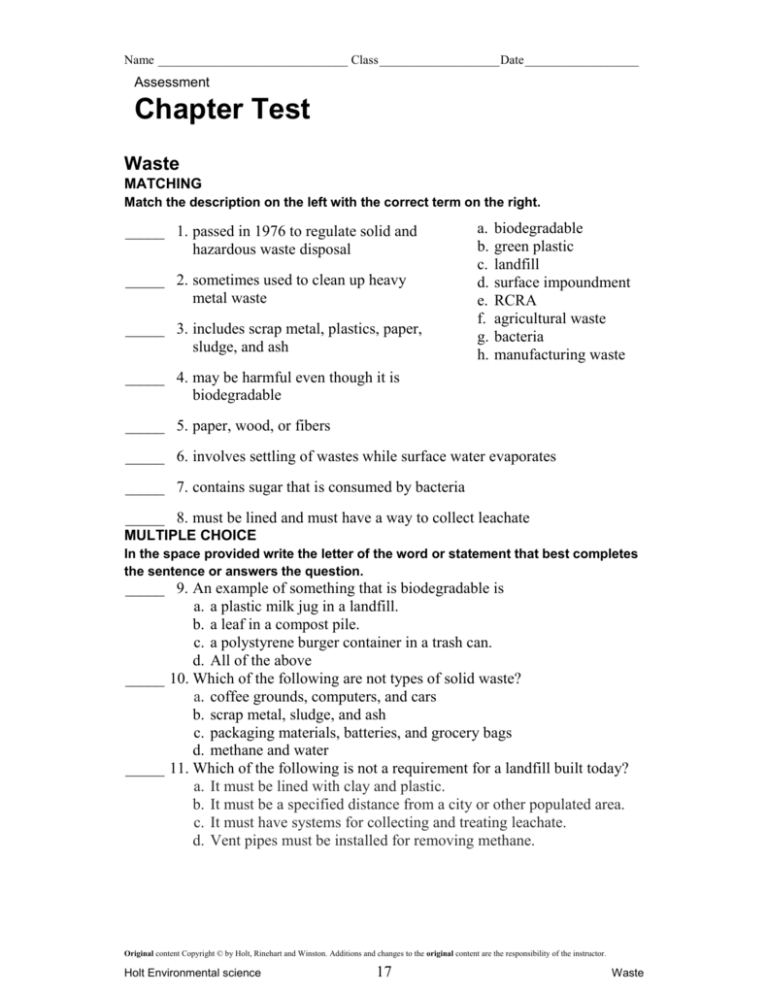
Name ______________________________ Class ___________________ Date __________________ Assessment Chapter Test Waste MATCHING Match the description on the left with the correct term on the right. _____ 1. passed in 1976 to regulate solid and hazardous waste disposal _____ 2. sometimes used to clean up heavy metal waste _____ 3. includes scrap metal, plastics, paper, sludge, and ash a. b. c. d. e. f. g. h. biodegradable green plastic landfill surface impoundment RCRA agricultural waste bacteria manufacturing waste _____ 4. may be harmful even though it is biodegradable _____ 5. paper, wood, or fibers _____ 6. involves settling of wastes while surface water evaporates _____ 7. contains sugar that is consumed by bacteria _____ 8. must be lined and must have a way to collect leachate MULTIPLE CHOICE In the space provided write the letter of the word or statement that best completes the sentence or answers the question. _____ 9. An example of something that is biodegradable is a. a plastic milk jug in a landfill. b. a leaf in a compost pile. c. a polystyrene burger container in a trash can. d. All of the above _____ 10. Which of the following are not types of solid waste? a. coffee grounds, computers, and cars b. scrap metal, sludge, and ash c. packaging materials, batteries, and grocery bags d. methane and water _____ 11. Which of the following is not a requirement for a landfill built today? a. It must be lined with clay and plastic. b. It must be a specified distance from a city or other populated area. c. It must have systems for collecting and treating leachate. d. Vent pipes must be installed for removing methane. Original content Copyright © by Holt, Rinehart and Winston. Additions and changes to the original content are the responsibility of the instructor. Holt Environmental science 17 Waste Name ______________________________ Class ___________________ Date __________________ Chapter Test continued _____ 12. Which of the following are problems associated with landfills? a. source reduction and composting b. leachate and methane production c. surface impoundment and leachate d. all of the above _____ 13 .Examples of ways that you can produce less waste include a. using canvas shopping bags. b. composting. c. using rechargeable batteries. d. All of the above _____ 14. You can use your consumer buying power to reduce solid waste by a. shopping at discount stores. b. buying something only when it is on sale. c. using rechargeable batteries. d. asking for paper bags instead of plastic bags. _____ 15. What steps are involved in the recycling of materials? a. composting, decomposing, and burning b. burning, aging, and putting the material into deep wells c. sorting, aging, and crushing d. sorting, cleaning, and crushing _____ 16. Which of the following is not a benefit of composting? a. It keeps organic wastes out of landfills. b. Anything can be composted. c. It increases the number of beneficial soil organisms. d. all of the above _____ 17. An advantage to green plastic is that it a. is green. b. uses 20 to 50 percent less fossil fuel to produce than regular plastic. c. degrades chemically. d. All of the above _____ 18. All of the following describe hazardous wastes except a. they may be solid or liquid but not gas. b. they may contain toxic, corrosive, or explosive materials. c. they may be cleaners, lubricants, or heavy metals. d. Both (a) and (b) _____ 19. Superfund and RCRA are administered and enforced by a. individual businesses. b. environmental activists. c. the United States EPA. d. local landfills. _____ 20. Ways to manage hazardous waste include a. chemical treatment and surface impoundment. b. chemical treatment and landfilling. c. landfilling and dilution in large bodies of water. d. spreading the waste over large areas. Original content Copyright © by Holt, Rinehart and Winston. Additions and changes to the original content are the responsibility of the instructor. Holt Environmental science 18 Waste TEACHER RESOURCE PAGE 22. Some waste simply does not burn; incinerators give off a certain amount of toxic particles and gases, even with pollution control devices; and the ash that remains after the waste is burned must still be disposed of. 23. Advantage: Unlike plastic made from petroleum, degradable plastics can break down partially with exposure to sunlight (photodegradable) or microorganisms (green plastic).Disadvantage: The plastic is not completely degradable in that it does not completely break down chemically. SECTION:REDUCING HAZARDOUS WASTE Matching 1. e 2. a 3. b 4. d 5. c Multiple Choice 6. b 7. c 8. a 9. b 10. c Chapter Test General MATCHING 1. 2. 3. 4. e g h f 5. 6. 7. 8. a d b c ALTERNATIVE ASSESSMENT 24. Answers may vary. You may wish to give extra credit for answers that seem practical and have a good chance of being put into practice. You may also wish to encourage the students with the best proposals to work together to actually present a recycling proposal to the student council and the school administration.The proposal should include the steps necessary in recycling. MULTIPLE CHOICE 9. 10. 11. 12. 13. 14. a b b b d c 15. 16. 17. 18. 19. 20. d b c a c a Chapter Test Advanced INTERPRETING GRAPHICS MATCHING 1. 2. 3. 4. 5. d e f a h 6. 7. 8. 9. 10. 25. a. 1980; b. about 1987; c. Answers may vary. Possible explanations might include that more glass is being recycled while plastic is recycled less often, or that many containers that were once made of glass are now made of plastic. c b g j i MULTIPLE CHOICE 11. 12. 13. 14. 15. b d a c c 16. 17. 18. 19. 20. b c b a b SHORT ANSWER 21. If the landfill is close to the city, residents of the city would not want to live near it, would see the value of their property decline, and would most likely organize protests against having the landfill close by. If the landfill is far from the city, trucks would have to drive the garbage long distances to dispose of it. This would lead to high costs to taxpayers for gas, oil, and road and truck maintenance, and would also contribute to air pollution. Original content Copyright © by Holt, Rinehart and Winston. Additions and changes to the original content are the responsibility of the instructor. Holt Environmental science 91 Waste

